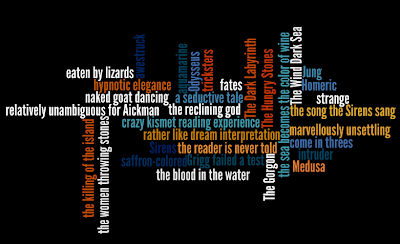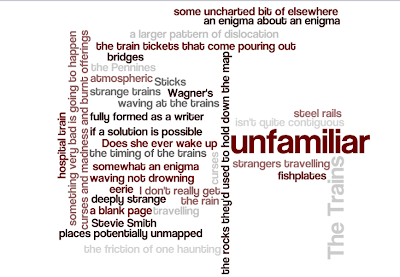 So, the always-excellent Vivienne Tuffnell invited me to participate in another of these author-blog-questions-pass-it-on-thingys. And as it's Viv, who was lovely enough to publish my ramblings about Weird Fiction, I've taken part.
So, the always-excellent Vivienne Tuffnell invited me to participate in another of these author-blog-questions-pass-it-on-thingys. And as it's Viv, who was lovely enough to publish my ramblings about Weird Fiction, I've taken part.
I live in Nottingham, a few miles out from the city centre. I was born in a village called Cotgrave, which you can just see if you zoom in on the map. If you move your finger left from there, you're at the place where The Shelter is/was - unless it only exists in my head (see the Afterword in that book).
I also lived in Oxford for three years.
Q: Have you always lived and worked in Britain or are you based elsewhere?
Always in Britain. England made me, essentially, despite what I think about a lot of the people and politics and whatnot here. It might be lurching evermore right-wing, but the beer's still good.
Q: Have you highlighted or showcased any particular part of Britain in your books, a town, a city, a county, a monument, well-known place or event?
A lot of my stories take place in an unnamed and unspecified (although still obviously English) city. However there's a few where real places have formed the basis for them. Red Route is set on a very specific stretch of road in Lincolnshire - the red route signs showing the numbers of deaths are real. And Home Time is very much about the differences the character sees between living in a village in Nottinghamshire and living in the almost dream-like city of Oxford.
Q: Tell us about one of your recent books...
I'm not sure any of them qualify as recent any more, so I'll just mention again that my next book, Falling Over, will be out in the summer from Infinity Plus.
Q: What are you currently working on?
I'm doing the formatting for a print-version of The Other Room as well as writing the first draft of a short story about someone alone in a lock-keeper's cottage. That character is sums up all I dislike about a certain kind of British (well, English) petty, immigrant-bashing nationalism, actually. The story's not finished yet, but he'll get his comeuppance, I think...
Q: How do you spend your leisure time?
This is like that last question on a job application that I never know how to answer... Reading, obviously - lots of reading. Listening to music. Cooking curries. Not doing as much swimming and exercise as I should.
Q: Do you write for a local audience or a global audience?
Neither, I don't think. I reckon it's more a global niche audience - that's the great thing about the internet, you can reach the people who have similar cult tastes to you no matter where they are. That said, I guess the stories do contain various British references, slang-words, spellings etc. so readers need to be at least open to that. But my readers are cool, so that's never been a problem.

